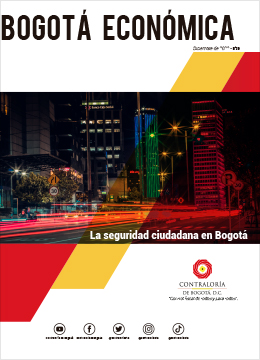
Estás filtrando por
Se encontraron 3385 resultados en recursos

La presente edición de la Revista Bogotá Económica recoge diversos análisis sobre el comportamiento de los principales delitos en la ciudad durante los últimos años y las diferentes estrategias que se han adoptado para abordarlos, en los que participaron expertos en la materia y con colaboraciones del Personero de Bogotá y del Secretario Distrital de Seguridad, Convivencia y Justicia; incluimos, igualmente, análisis efectuados desde la Dirección de Estudios de Economía y Política Pública sobre el sistema de responsabilidad adolescente, la guía para ciudades más seguras herramientas para generar entornos urbanos seguros y libres de miedo desde el enfoque preventivo y evolución de la seguridad ciudadana en Colombia en tiempos del COVID-19
Fuente:
Contraloría de Bogotá - Revista Bogotá Económica
Formatos de contenido:
Publicaciones periódicas
Compartir este contenido
Bogotá Económica 20 - diciembre
Copia el enlace o compártelo en redes sociales
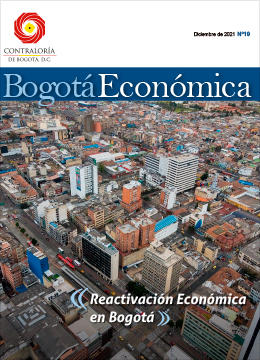
Bogotá Económica 19 - diciembre
La edición 19 de la revista ‘Bogotá Económica’ está dedicada al proceso de reactivación económica que se desarrolla en la ciudad y a las diferentes estrategias impulsadas desde los sectores público y privado, en medio de un contexto donde aún persiste la preocupación por la escalada de la inflación, especialmente en el sector de alimentos, y por los problemas en la cadena de suministros a nivel global.
Fuente:
Contraloría de Bogotá - Revista Bogotá Económica
Formatos de contenido:
Publicaciones periódicas
Compartir este contenido
Bogotá Económica 19 - diciembre
Copia el enlace o compártelo en redes sociales
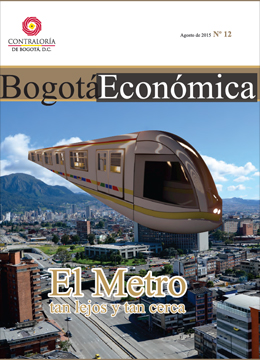
Bogotá Económica 12 - agosto
La contrucción de la Primera Línea del Metro de Bogotá (PLMB) es, sin duda, el mayor reto que hasta ahora ha tenido la ciudad, y compromete no solo a las instituciones nacionales y distritales, sino que requiere de la colaborción de sus habitantes. Esperamos que esta vez realmente se logre su culminación para beneficio de todos.
Fuente:
Contraloría de Bogotá - Revista Bogotá Económica
Formatos de contenido:
Publicaciones periódicas
Compartir este contenido
Bogotá Económica 12 - agosto
Copia el enlace o compártelo en redes sociales
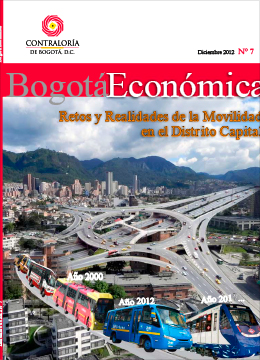
Bogotá Económica 07 - diciembre
Esta séptima edición de la revista “Bogotá Económica” tiene como tema principal la movilidad en la ciudad, y se explora además, la relación de este y otros aspectos con la competitividad.
Fuente:
Contraloría de Bogotá - Revista Bogotá Económica
Formatos de contenido:
Publicaciones periódicas
Compartir este contenido
Bogotá Económica 07 - diciembre
Copia el enlace o compártelo en redes sociales
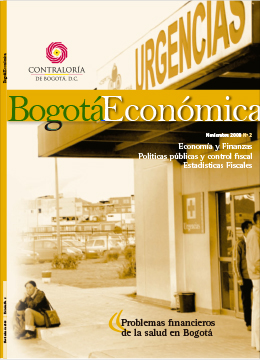
Bogotá Económica 02 - noviembre
La Contraloría de Bogotá, a través de su Revista Bogotá Económica, ofrece un
foro sobre la economía, las finanzas y las políticas públicas locales y sus relaciones con el país y el mundo. La intención es abordar tanto los asuntos actuales como los que trascienden coyunturas en la agenda de la ciudad. En este propósito, luego de un primer número, cuyo Informe especial fue el Metro y que ha merecido comentarios positivos que agradecemos, en esta segunda entrega abordamos la problemática financiera de la salud en Bogotá como tema central.
Fuente:
Contraloría de Bogotá - Revista Bogotá Económica
Formatos de contenido:
Publicaciones periódicas
Compartir este contenido
Bogotá Económica 02 - noviembre
Copia el enlace o compártelo en redes sociales
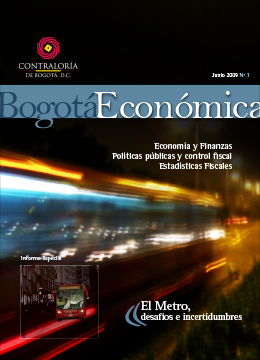
Bogotá Económica 01 - junio
En esta primera edición, las secciones Informe Especial y El Foro están dedicadas al Metro. Su construcción, hoy cobra renovada vigencia en la agenda pública bogotana, tanto por el respaldo que le dio la elección social, como por la crisis de la movilidad. No se puede aplazar más la solución de un sistema de transporte masivo de alta capacidad e integración modal y tarifaria que contribuya no sólo a aprovechar eficientemente las vías sino a disminuir la segregación social. Pero ello debe estar articulado con el Plan de Ordenamiento Territorial-POT y el Plan Maestro de Movilidad-PM, así como ser consistente con el Sistema Integrado de Transporte
Público-SITP, en lo cual es crucial la sustitución del esquema de empresas afiliadoras por el de empresas operadoras del transporte público colectivo y que se viabilice la democratización
Fuente:
Contraloría de Bogotá - Revista Bogotá Económica
Formatos de contenido:
Publicaciones periódicas
Compartir este contenido
Bogotá Económica 01 - junio
Copia el enlace o compártelo en redes sociales
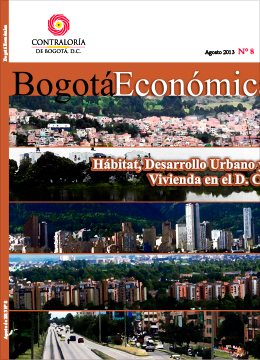
Bogotá Económica 08 - agosto
La octava edición de la Revista Bogotá Económica está dedicada al complejo tema del desarrollo urbano en la ciudad y su interacción con los seres humanos que la habitan y el medio ambiente.
Fuente:
Contraloría de Bogotá - Revista Bogotá Económica
Formatos de contenido:
Publicaciones periódicas
Compartir este contenido
Bogotá Económica 08 - agosto
Copia el enlace o compártelo en redes sociales
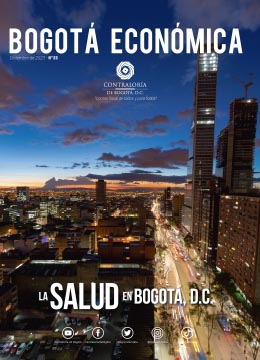
Bogotá Económica 22 - diciembre
La edición 22 de la revista institucional de la Contraloría de Bogotá D.C. está dedicada a uno de los temas más sensibles para la ciudadanía: la prestación de los servicios de salud. Teniendo en cuenta los debates dados en el panorama nacional, ante una reforma al sistema de salud, se ha considerado pertinente examinar diferentes aspectos sobre el funcionamiento del sistema en el
Distrito Capital, el comportamiento de los indicadores de salud y las perspectivas sobre el futuro. Los expertos invitados que apoyan esta edición con sus artículos presentan diferentes análisis sobre los referenciados aspectos, de una manera autónoma y libre y sin comprometer el
criterio de este órgano de control fiscal.
Fuente:
Contraloría de Bogotá - Revista Bogotá Económica
Formatos de contenido:
Publicaciones periódicas
Compartir este contenido
Bogotá Económica 22 - diciembre
Copia el enlace o compártelo en redes sociales
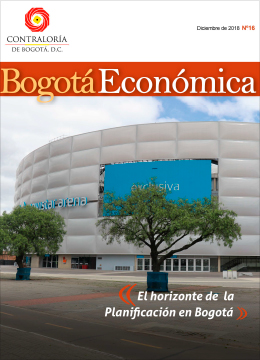
Bogotá Económica 16 - diciembre
La edición número 16 de la Revista Bogotá Económica se dedica al tema de
la planificación. La ciudad se encuentra en un momento determinante para su
futuro, ya que se está ad portas de la formulación de un nuevo Plan de Ordenamiento Territorial-POT y las evaluaciones efectuadas sobre el cumplimiento del anterior POT mostraron serias dificultades, entre ellas, la falta de coordinación entre instrumentos de corto plazo como los planes de desarrollo, con los de largo plazo como el POT, que dejaron sin ejecución muchas iniciativas; la falta de una visión regional que no permitió armonizar el POT de Bogotá con los de los municipios en su área de influencia; y el rezago en los temas ambientales. Aspectos que se espera que se superen con el POT que se aprobará para los próximos años.
Fuente:
Contraloría de Bogotá - Revista Bogotá Económica
Formatos de contenido:
Publicaciones periódicas
Compartir este contenido
Bogotá Económica 16 - diciembre
Copia el enlace o compártelo en redes sociales
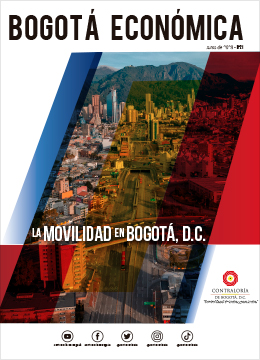
Bogotá Económica 21 - junio
La edición 21 de la Revista Bogotá Económica de la Contraloría de Bogotá D.C., está dedicada al análisis de la gestión fiscal de la Administración Distrital para la implementación de las diferentes políticas públicas, programas, planes y proyectos orientados a atender las soluciones en materia de movilidad en la ciudad, un aspecto que se constituye en una de las mayores preocupaciones de
los bogotanos y que afecta la calidad en términos de tiempos usados en desplazamientos, más aún cuando Bogotá fue identificada como la sexta
ciudad con el peor tráfico en el mundo y la primera en Latinoamérica, con 122
horas anuales perdidas en trancones, según el Global Traffic Scorecard en 2022, que analiza más de 1.000 ciudades en 50 países.
Fuente:
Contraloría de Bogotá - Revista Bogotá Económica
Formatos de contenido:
Publicaciones periódicas
Compartir este contenido
Bogotá Económica 21 - junio
Copia el enlace o compártelo en redes sociales
Selecciona las Colecciones en las que vas a añadir el contenido
Para consultar los contenidos añadidos busca la opción Tus colecciones en el menú principal o en Mi perfil.
